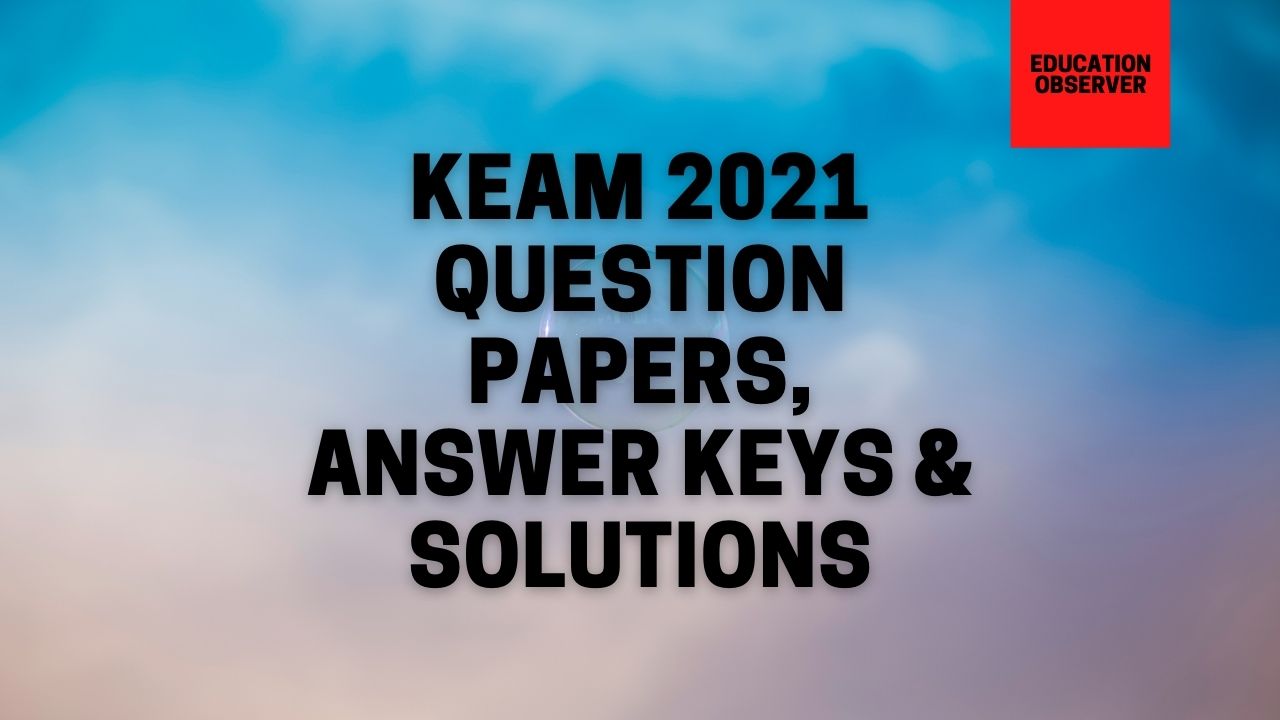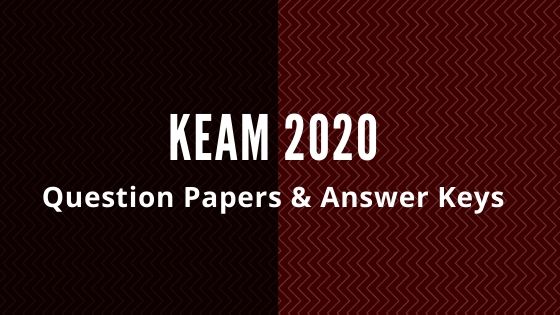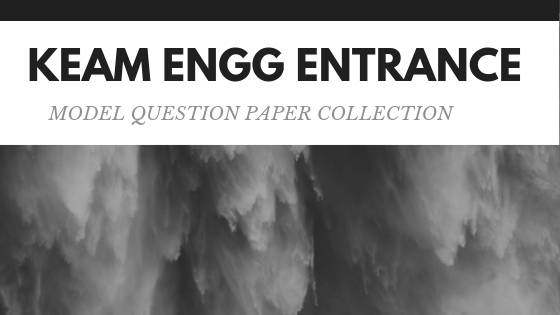Download the question papers, answer keys and solutions of Kerala Engineering. Agicultural and Medical Entrance Examination KEAM 2021 for Paper I and Paper II prepared by Coaching Institutes together with the official Key prepared by CEE Kerala.
Update: Official answer keys of CEE Kerala is available for download
KEAM 2021 Entrance Examination 2021 was conducted on 5th August by CEE Kerala. The exam was conducted in 2 sessions Paper I Physics and Chemistry is conducted in the morning session and Paper II Mathematics in the afternoon session.
Official Answer keys for KEAM 2021
The official answer keys of Kerala Engineering Entrance examination is expected to be released within one week, check the official CEE website for the official keys
KEAM 2021 Answer Keys by Coaching Institutes
Many prominent institutes release the keys of KEAM entrance to help the students to assess their performance. Download the keys from the links given below.
KEAM 2021- Physics Questions and Answer Keys
- The ratio of the magnitudes of electrostatic force between two protons at a distance r apart to that between two electrons at the same distance of separation is
(A)1:1
(B) 2:1
(C) 1:2
(D) 4:1
(E) 1:4
Ans: (A)1:1 - “When two charges are kept in air medium, at certain distance d apart, the force between them is F. When they are kept in a dielectric medium at the same distance of separation, the force between them becomes F/2. Then the dielectric constant of the medium is
(A)5
(B) 2
(C) 4
(D) 3
(E) 8
Ans: (B) 2 - The magnitude of the drift velocity per unit electric field is defined as
(A)mobility
(B) resistivity
(C) conductivity
(D) current density
(E) impedance
Ans: (A)mobility - In Cyclotron, the frequency of revolution of the charged particle in a magnetic field is independent of
(A) Its mass
(B) Its energy
(C) Oscillatory frequency
(D)magnetic field
(E)its charge
Ans: (B) Its energy - The hard ferromagnetic material among the following is
(A) gadolinium
(B) iron
(C) cobalt
(D) alnico
(E) nickel
Ans: (D) alnico - Eddy currents are not used in the application of
(A) induction furnace
(B)thermal generators
(C) electromagnetic damping
(D) electric power meters
(E) magnetic braking in trains
Ans: (B)thermal generators - An object is placed at l0 cm in front of a concave mirror. If the image is at 20 cm from the mirror on the same side of the object, then the magnification produced by the mirror is
(A) 3
(B) -0.5
(C) -2
(D) 0.33
(E) -1
Ans: (C)-2 - Area under the force-time graph gives the change in
(A) velocity
(B) acceleration
(C) linear momentum
(D) angular momentum
(E) impulsive force
Ans: (C) linear momentum - With the increase of temperature
(A) surface tension of liquid increases
(B) viscosity of gases decreases
(C) viscosity of liquids increases
(D) both the surface tension and viscosity of liquids increase
(E) both the surface tension and viscosity of liquid decrease
Ans: (E) both the surface tension and viscosity of liquid decrease - When no external torque acts on a rotating system,
(A) angular momentum of the system is not conserved
(B) its rotational kinetic energy is conserved
(C) its rotational kinetic energy is independent of moment of inertia
(D) its rotational kinetic energy is directly proportional to moment of inertia
(E) its rotational kinetic energy is inversely proportional to moment of inertia
Ans: (E) its rotational kinetic energy is inversely proportional to moment of inertia
For complete question paper and solutions, visit the link below
KEAM 2021- Chemistry Questions and Answers
- In the first row transition metals, the clement that exhibits only +3 oxidation state is
(A) zinc
(B) scandium
(C) nickel
(D) titanium
(E) iron
Ans: (B) scandium - The metal that has the highest melting point in the in series of transition elements is
(A) titanium
(B) vanadium
(C) chromium
(D) iron
(E) manganese
Ans: (B) vanadium - Which one of the following is an ore of aluminium?
(A) Kaolinite
(B) Siderite
(C) Malachite
(D) Calamine
(E) Haematite
Ans: (A) Kaolinite - In the estimation of nitrogen present in an organic compound, Kjeldahl’s method cannot be applied to
(A) aniline
(B) toluidine
(C)urea
(D) pyridine
(E) benzylamine
Ans: (D) pyridine - Fibrous protein present in muscles is
(A) keratin
(B) albumin
(C) insulin
(D) myosin
(E) histidine
Ans: (D) myosin - The drug used to inhibit the enzymes which catalyse the degradation of noradrenaline is
(A) phenelzine
(B) prontosil
(C) cimetidine
(D) terfenadine
(E) chloramphenicol
Ans: (A) phenelzine - Which one of the following is true?
(A) Chemisorption is not specific in nature
(B) Physisorption is irreversible
(C) Both physisorption and chemisorption depend on the nature of the gas
(D) Enthalpy of adsorption is high in physisorption
(E) Chemisorption increases with surface area of adsorbent while in physisorption it is not.
Ans: (C) Both physisorption and chemisorption depend on the nature of the gas - When zinc metal is reacted with aqueous sodium hydroxide, the Product. formed are
(A) zinc hydroxide and oxygen only
(B) sodium zincante and oxygen only
(C) sodium zincante, hydrogen and oxygen
(D) sodium zincante and hydrogen only
(E) sodium zincante and hydrogen oxide only
Ans: (D) sodium zincante and hydrogen only - The first ionization enthalpy is the least in
(A) Germanium
(B) Antimony
(C) Tellurium
(D) Arsenic
(E)Bismuth
Ans: (E)Bismuth - “No two electrons in an atom can have the same set of four quantum numbers.” This is known as
(A) Hund’s rule
(B) Pauli’s exclusion principle
(C) Aufbau principle
(D) Heisenberg’s principle
(E) Fajan’s rule
Ans: (B) Pauli’s exclusion principle
Download the Complete answer key from the link below



Please send 2022 question paper
Please give all the materials needed for the next keam
Please give complete solutions for maths paper
Ok
Please add maths solutions
It’s updated in the paper 2 link.please check
Thank you very much…
You are welcome. Please share it with your friends